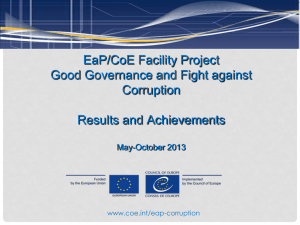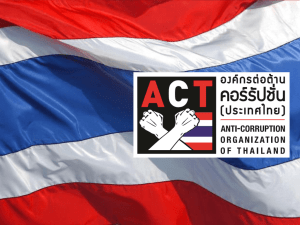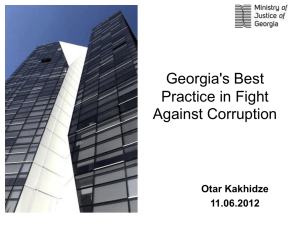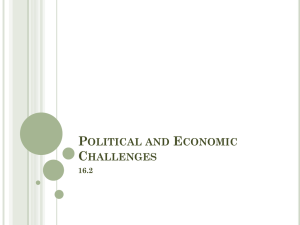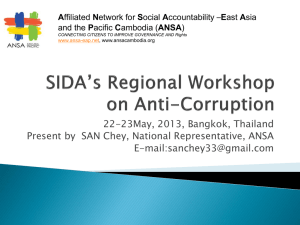Dr. Raimundas Kalesnykas
advertisement
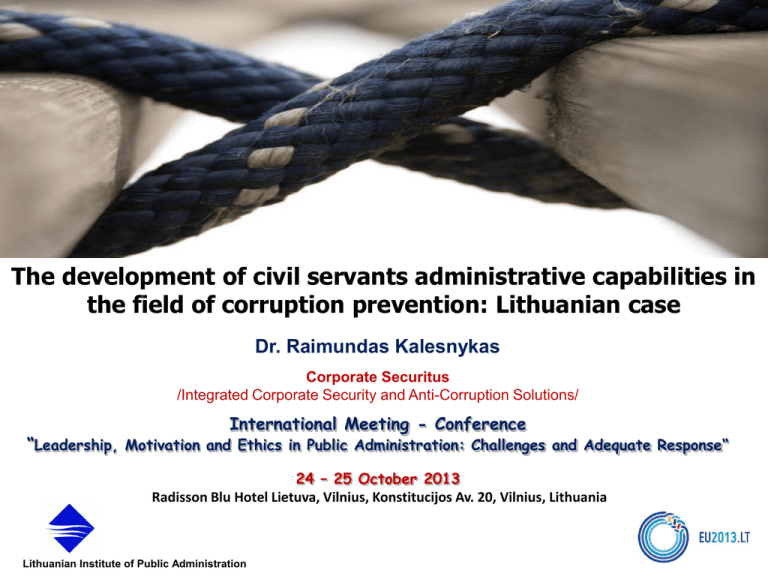
The development of civil servants administrative capabilities in the field of corruption prevention: Lithuanian case Dr. Raimundas Kalesnykas Corporate Securitus /Integrated Corporate Security and Anti-Corruption Solutions/ International Meeting - Conference “Leadership, Motivation and Ethics in Public Administration: Challenges and Adequate Response“ 24 – 25 October 2013 Radisson Blu Hotel Lietuva, Vilnius, Konstitucijos Av. 20, Vilnius, Lithuania Lithuanian Institute of Public Administration SOME FACTS Corruption Perception Index in Lithuania 2012 - 54 score 48th rank in the world (176 countries) 20th rank in EU 2nd rank between Baltic states (Latvia – 49, Estonia – 64) CORRUPTION PERCEPTION INDEX , LITHUANIA 1999–2012 Year Index Total Country Rank 1999 3,8 99 50 2000 4,1 90 43 2001 4,8 91 38 2002 4,8 102 36 2003 4,7 133 41 2004 4,6 146 44 2005 4,8 154 44 2006 4,8 163 46 2007 4,8 180 51 2008 4,6 180 58 2009 4,9 180 52 2010 5,0 178 46 2011 4,8 182 50 2012 5,4 176 48 NATIONAL ANTI-CORRUPTION PROGRAM OF THE REPUBLIC OF LITHUANIA 2011 -2014 PRIORITY AREAS Legislation Control of courts and law enforcement activities Business supervision Public procurement supervision Health supervision Territorial planning and construction supervision ------- -----------Anti-corruption education and training------------------- INITIATIVE A coordinated approach: strengthening administrative capabilities of civil servants seeking effective and professional knowledge in the field of corruption prevention Training in the Field of Corruption Prevention Educational Sector (universities, research institutes) Private sector Public sector Ministry of the Interior of the Republic of Lithuania Lithuanian Institute of Public Administration Civil Service Department (providing anti-corruption services to public and private sector Special Investigation Service of the Republic of Lithuania LEGAL BACKGROUND Operational Programme for the Development of Human Resources for 2007–2013 PRIORITY 4 Fostering administrative competences and increasing efficiency of public administration MEASURE VP1-4-1-VRM-02-V Improving in-service training of EU policy and ethic norms in public service PROJECT: Professional development the knowledge of public servants, working in the state and municipal institutions and enterprises, in the field of corruption prevention STATE CIVIL SERVICE TRAINING STRATEGY FOR 2011-2013 Paragraph 6.3 sets the priority purpose: to improve and develop public servants knowledge in the field of professional ethics and corruption prevention PROJECT (2013-2015) PROFESSIONAL DEVELOPMENT THE KNOWLEDGE OF PUBLIC SERVANTS, WORKING IN THE STATE AND MUNICIPAL INSTITUTIONS AND ENTERPRISES, IN THE FIELD OF CORRUPTION PREVENTION TARGET GROUP State politicians (together with Members of Municipalities’ Councils); Civil Servants (state and municipal servants) Statutory public servants Public service employees (heads of institutions, public servants of political (personal) confidence) Other employees of state and municipal enterprises, employed in accordance with the Labour Code IMPLEMENTATION Duration – 24 months (ending 1 September 2015) Trained participants – 2700 public servants HUMAN RESOURCES FOR IMPLEMENTATION (18) Project Manager – Expert (1) Project Coordinators – Experts (2) Lecturers – specialists (15) DEMANDS OF TARGET GROUP FROM TRAINING Development of knowledge, skills and capabilities in the field of corruption prevention Contribution to the strengthening of administrative capabilities in the public administration sector (through the improvement of the professional qualification) To ensure the transparency of administrative procedures To ensure the high-quality performance of the public administration functions To improve the image of civil servants in the community EXPECTATIONS OF TARGET GROUP FROM TRAINING To perceive corruption as a social phenomenon and to identify the specific types of corruptive behavior; To explain the causes and circumstances of corruption and to identify the most important risk factors; To assess the vulnerability of specific programs (laws, administrative decisions) from corruptive actions; To assess how to reduce the level and risk of corruption in specific branches of government; To support the anti-corruption strategies and reforms; To promote the accountability and transparency in the implementation of various state (local) government programs; To acquire knowledge about the legal regulation of corruption prevention at national and international levels, also about the institutions, responsible of corruption prevention and control QUALITY REQUIREMENTS TO THE PROJECT Teaching methods must be applied by the experience of EU Member States and international organizations/actors Teaching methods must ensure a high-quality training results (workshops, case studies and case analysis must be at least 50% of total training time) Necessary to implement a systematic, practice-based (combined with appropriate theoretical framework) training in the anti-corruption field Development the new and unique training programs, which are corresponding to needs of the participants (programs must be consistent with each other, wide-ranging and better satisfy the training needs of participants) Training handout package must be with no less than 25 pages Not less than 80% of training participants are completely satisfied with the quality of training The organization (service provider) must submit regular reports to the Customer (Lithuanian Institute of Public Administration) about the implementation of each training event and final report about the implementation of the project PROJECT (2013-2015) PROFESSIONAL DEVELOPMENT THE KNOWLEDGE OF PUBLIC SERVANTS, WORKING IN THE STATE AND MUNICIPAL INSTITUTIONS AND ENTERPRISES, IN THE FIELD OF CORRUPTION PREVENTION TRAINING TOPICS 1. State governance and fight against corruption (900) 2. Corruption prevention and control (750) 3. Anti-corruption assessment of legal acts and the drafts of legal documents (150) 4. Corruption prevention in the health security sector (120) 5. Corruption prevention in the public procurement (180) 6. Corruption prevention in the field of EU structural assistance, grants and subsidies (240) 7. Corruption prevention in the field of territorial planning and construction (180) 8. Corruption prevention in the field of business supervisory (60) 9. Corruption prevention training for statutory officers (120) CONCLUSIONS 1. This is the first of its kind project in Lithuania covering a complexity of strengthening the administrative capabilities of different civil servants from various type public institutions 2. The results of the project will create conditions for civil servants to carry out its public administration functions qualitatively and effectively 3. It is assumed that the public servants acquired knowledge in the field of corruption prevention and control will contribute to administrative capacity building in the system of Lithuanian civil service and reducing the corruption cases 4. Contribute to the understanding “the philosophy of anti-corruption”, decrease the level of the corruption and increase transparency in public sector! THANK YOU FOR YOUR ATTENTION! Dr. Raimundas Kalesnykas CORPORATE SECURITUS /Integrated Corporate Security and Anti-Corruption Solutions/ Goštauto str. 40, LT- 01112, Vilnius, Lithuania 00370 679 44441 raimundas.kalesnykas@corporatesecuritus.com www.corporatesecuritus.com



